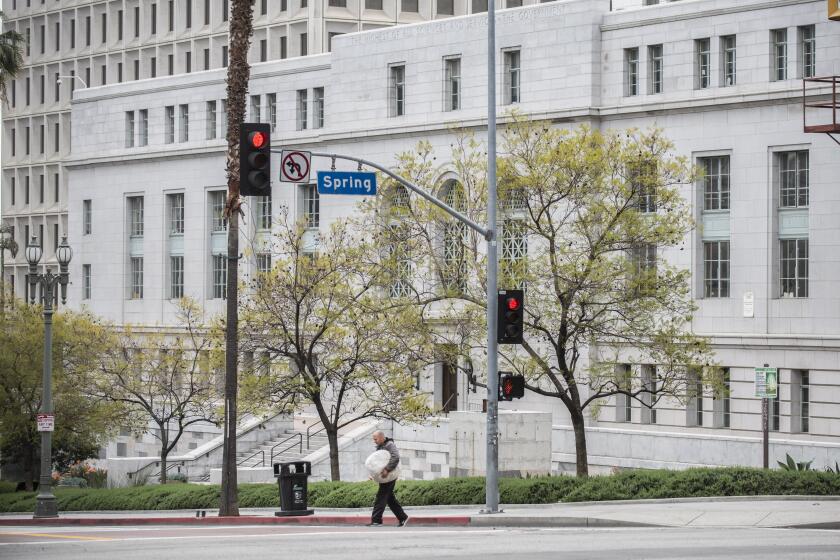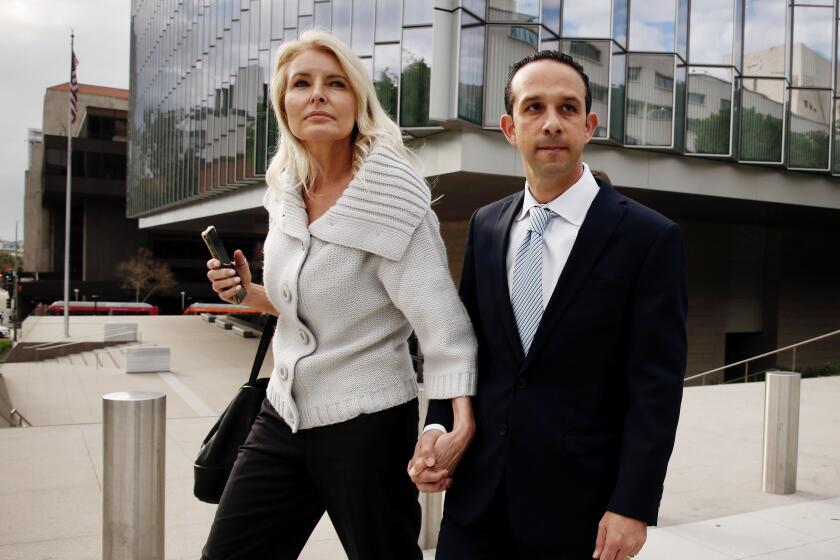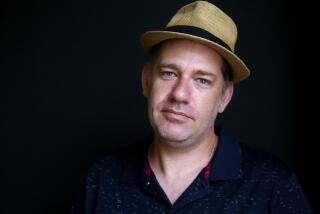Federal investigation into L.A. City Hall corruption involves downtown project
- Share via
When federal prosecutors filed their latest corruption case involving Los Angeles City Hall, they filled their court filings with lurid details: a paper bag filled with cash for a council member, a bathroom meeting to discuss the alleged bribe, and insistent texts from that council member angling for the money.
What investigators did not say was who allegedly provided a $500,000 bribe meant for a sitting council member in order to smooth the way for a new project. In court filings, prosecutors identified that figure only as Developer C.
But numerous details in the U.S. attorney’s case point to the project at the heart of the case: a 20-story residential tower planned at the corner of Hill Street and Olympic Boulevard in downtown Los Angeles, a Times analysis has found.
Last month, political fundraiser Justin Jangwoo Kim agreed to plead guilty to felony bribery for helping the unnamed developer arrange the alleged bribe. Federal officials didn’t name the council member but provided key details in their filings that make clear that the elected official is Councilman Jose Huizar. An attorney for Huizar declined to comment.
The case against Kim also features numerous details about the real estate project at the center of the alleged bribery scheme. The Hill Street project matches those details, including when the site was purchased, when an appeal was lodged against the project and when that challenge was withdrawn.
An L.A. political fundraiser has agreed to plead guilty to a bribery charge for helping a real estate developer pay off a member of the City Council.
The company seeking to develop the tower, 940 Hill LLC, has three members who have done business in L.A.’s Fashion District: merchant and real estate developer Dae Yong Lee, clothing manufacturer and real estate investment company member Jeong Suk Kim, and Hyuk Lim, who has headed apparel companies, according to state business records.
Ariel Neuman, an attorney representing Lee, said his client “has not been charged with any wrongdoing.”
“We are cooperating with the government’s investigation and look forward to a swift resolution clearing his name,” Neuman said. He declined to address specific allegations in the federal filing, including references to a bag of cash.
Lee, in a phone call this week, said he is leading the Hill Street development project as its “managing member.” Asked whether his business partners could have provided a bribe to a council member, Lee said, “They would never do that.”
The Times was unable to reach Jeong Suk Kim, a second member of the company pursuing the Hill Street project, who is identified in campaign contribution records as the owner of the Maria Bonita clothing company. Hyuk Lim, the third member of the company, did not respond to messages left at his residence.
Lee heads the Fashion District companies Joia Trading and Joia Accessories and is associated with a long list of other companies in real estate development, the restaurant industry and retail, according to state records.
Until recently, Lee was planning to remake the Little Tokyo Galleria, a multilevel shopping center owned by one of his companies, adding nearly 1,000 units of housing. Those plans were withdrawn in October.
Lee and his companies have given to several local politicians, including council members Huizar, Herb Wesson, David Ryu, Mitch O’Farrell and Gil Cedillo, and Mayor Eric Garcetti, according to city records. The Ryu campaign returned two donations from his companies last year, after critics argued Ryu had broken a promise not to take developer contributions.
As L.A. officials battle the coronavirus pandemic, a corruption scandal has fueled mistrust in City Hall.
The Hill Street project was granted approval by L.A.’s planning department three years ago, and an application for building permits was turned in at the end of December. U.S. attorney’s office spokesman Thom Mrozek declined to comment on whether the downtown project was the one involved in the case, but it matches key details in federal filings by prosecutors:
- Prosecutors said the residential project involved in their case was challenged by a labor group in summer 2016. In August 2016, Creed LA — an organization made up of construction trade unions — filed an appeal over the 20-story residential project on Hill Street.
- Prosecutors said a company owned by the unnamed developer had purchased the site for the residential development in 2008. The real estate firm 940 Hill LLC bought the Hill Street property in 2008, according to a spokesman for the county assessor.
- Prosecutors said the planned development was in the district of the council member who was seeking the bribe. The planned Hill Street project is in Huizar’s district.
- Prosecutors also said that after a bribe was arranged, a city official was informed that the labor appeal had been dropped March 3, 2017. Creed LA sent planning officials an email asking to withdraw its appeal on the Hill Street project March 3, 2017, according to records obtained by The Times.
Planning department officials say that no other appeals were dropped on March 3, 2017. Only one other appeal for a residential project was withdrawn that entire month, according to the planning department.
But that challenge was over a project in L.A.’s Mid-City neighborhood, well outside Huizar’s district. The site for the Mid-City project was not purchased in 2008. And the challenge was brought by a neighborhood group, not a labor organization.
The Times also checked other projects that were challenged by labor groups around the same time as the Hill Street project, which did not match up with other details provided by prosecutors about the development involved in the case.
Creed LA Executive Director Jeff Modrzejewski did not respond to phone calls Wednesday seeking comment on the Hill Street project appeal and its withdrawal.
More to Read
Sign up for Essential California
The most important California stories and recommendations in your inbox every morning.
You may occasionally receive promotional content from the Los Angeles Times.














